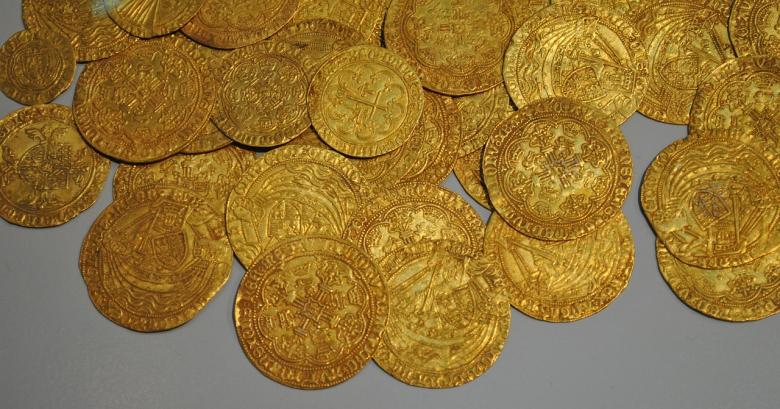
Image by Tim C. Gundert / Pixabay
I love this conversation!
I’ve often said that we misinterpret Jesus’ remark to ‘give unto Caesar what is his, and give to God what is God’s’. I’ve heard it growing up that we are to pay our taxes and be good citizens. After all, that’s literally what the verse says. However, it seems to me that this is another parable that we have missed. Not only a parable, I would say this falls into the paradox category. Fun!
Let’s Define Some Terms
First off, let’s talk about parables and paradoxes. A parable is a story with a hidden message. Think of it like a fairy tale, fable, or allegory. It is a story that is relatable to the audience hearing it, but conveys a deeper meaning. That’s why we tell fairy tales about how beauty is what’s inside, not outside (Beauty and the Beast) or that following all temptations can lead to danger (Hansel and Gretel).
On the other hand, an paradox is an absurd or self-contradicting statement. But this statement, upon further reflection, tells us a deep truth. They’re similar (and I would argue connected), but they are different. So here, I think Jesus uses a paradox inside a discussion using parables to further cloak his message and keep it hidden.
The Context of Caesar’s Coins
It is widely known that tax collectors were generally hated by the Jews during this time. Rome would often employ Jewish people to collect taxes since it was less likely to cause an uprising. This made the Jewish tax collector a pariah in their community (see Matthew 9:10-11) and lumped in with the ‘sinners’ Jesus associated with.
They were often dishonest, which is why John the Baptist tells them to be honest when collecting (Luke 3:12-13) and the famous Zacchaeus promised to pay back what he stole in ‘taxes’ at interest (Luke 19:8). Joachim Jeremias talks about it in his book Jerusalem in the Time of Jesus. Tax collectors were viewed as traitors to their Jewish family by pledging their allegiance to the Roman Empire.
Context of the Parable
This story can be found in both Mark 12:13-17 and Matthew 22:15-22.
If you’re wondering why these are almost word for word the same, I talk about it a little in THIS ARTICLE.
But before we get into the coins, let’s look at what Jesus was talking about before and after. Let’s give this some context since it’s often used without context.
Both Matthew and Mark have Jesus in Jerusalem talking with the religious leaders of the day (Matt. 21:23-27; Mark 11:27-33). The leaders are questioning where Jesus’ authority comes from. Why should they listen to him? After all, he’s dining with sinners, blaspheming, and not keeping the Law! Jesus draws on his baptism by John the Baptist, asks the authorities where John’s authority came from, and leaves them speechless.
Jesus then beings preaching using parables (or stories with a deeper meaning). These have been coined as the Parable of the Wicked Tenants (Mt. 21:33-46; Mk. 12:1-12), Parable of the Two Sons (Mt 21:28-32), and the Parable of the Wedding Feast (Mt. 22:1-14).
In the same discourse, Jesus addresses questions regarding the resurrection (Mt. 22:23-33; Mk. 12:18-27). They ask him what would happen to a woman who outlived their husbands, finding multiple ‘husbands’ in heaven? They ask Jesus ‘what is the greatest commandment?’ (Mt. 22:34-40; Mk. 12:18-27). The last story in both gospels is that of the Christ’s relation to David (Mt. 22:41-46; Mk. 12:35-37). He flips the intended meaning to these questions and answers with the vision of the Kingdom of God.
The Problem and the Paradox
Sandwiched between Jesus’ powerful imagery is the question of taxes (Mt. 22:15-22; Mk. 12:13-17). Remember that the tax collectors were hated because of their allegiance to Rome? Well, the question ‘should Jews pay their Roman taxes?’, is not a mere thought experiment. If Jesus says yes, then he’ll be discredited as a traitor. If he says no, he is now a traitor to Rome and could be accused of inciting an insurrection. This answer has serious social and political implications.
At first, Jesus’ answer may seem like he’s trying to avoid the question. “Pay Caesar what belongs to Caesar—and God what belongs to God.” (Mt. 22:21; Mk. 12:17). Basically, pay your taxes and be a good citizen, then give God the rest. That doesn’t seem right, does it? I have seen the script reversed, where we give to God first, then to the government. But these don’t feel right. Why would Matthew, reflecting on the life of Jesus, include this milquetoast response?
This is where I think this story shines! I don’t think this is a command – I think it’s a question.
I think Jesus is asking the religious leaders, ‘What is Caesars? What is God’s? After all, looking back on Jesus’ teachings, we owe everything to God. If we owe God everything, then what is left for Caesar?
And because this paradox is also a parable, I don’t think Jesus really cared if someone paid their taxes. I think it comes down to the question of who you align with. Are you giving yourself to the Empire, or are you giving yourself to the Kingdom of God?
What Now?
Believe it or not, I am not endorsing tax evasion. I would love it if more people paid taxes (looking at you 1%!). Again, I don’t think Jesus cared about paying taxes. I think this is the moral of the story when Christianity finds itself struggling for power in a capitalist government.
The answer isn’t the answer, rather the answer is within the answer. What belongs to God? What belongs to the Empire? At the end of the day, where does your true loyalty lie? What is left for Caesar when we give God what is owed to Them?

Brad is a graduate student at Northwind Theological Seminary studying theology and the changing religious landscape in America. He works as a co-investigator at the University of Rhode Island’s College of Pharmacy providing education and support for rural New Englanders impacted by the opioid epidemic. Brad spends nights and weekends playing in regional bands as a bassist, guitarist, and vocalist. When not at a computer, he loves to spend time with his wife and chasing his toddler around the house. You can go to his website to get updates on his writing and other events.













